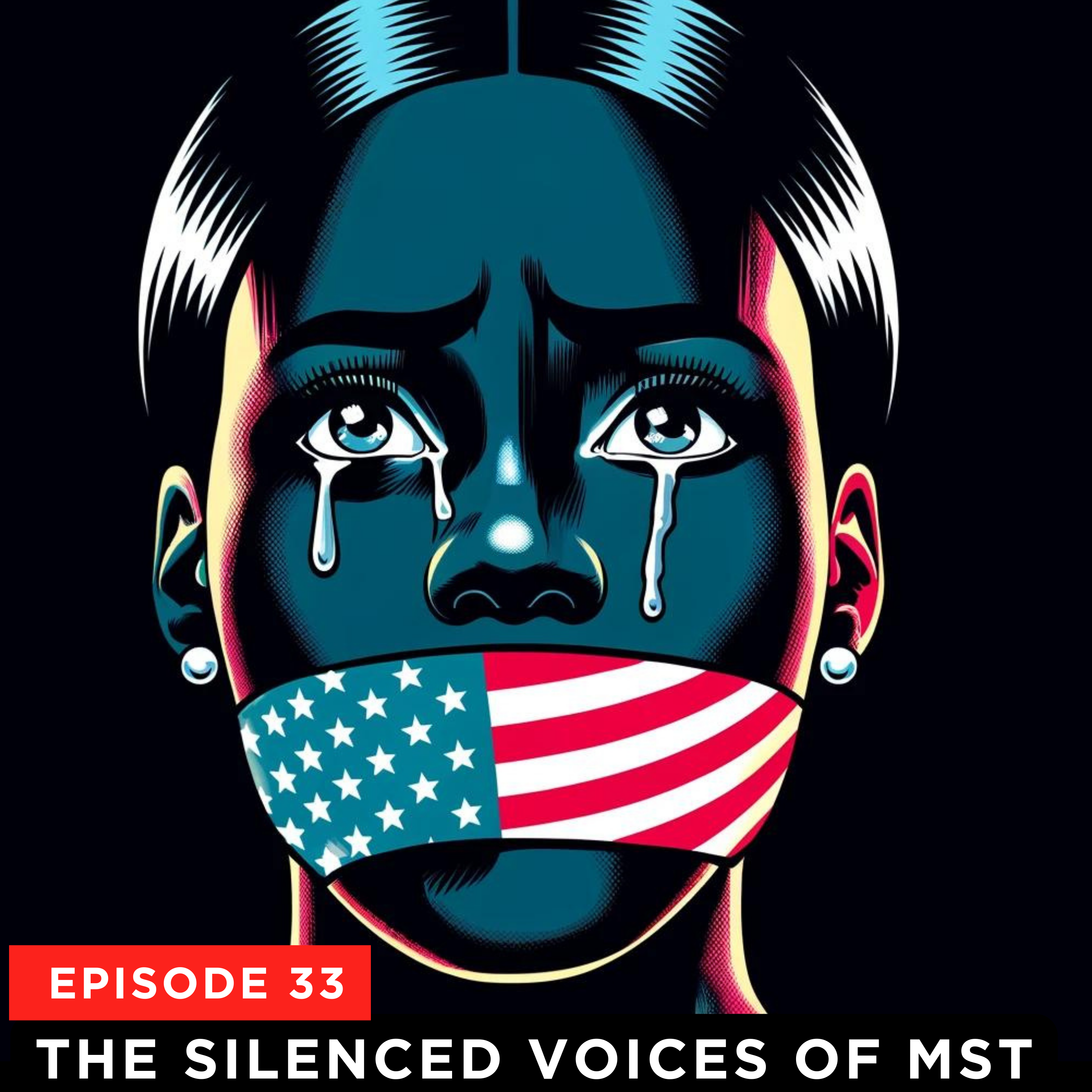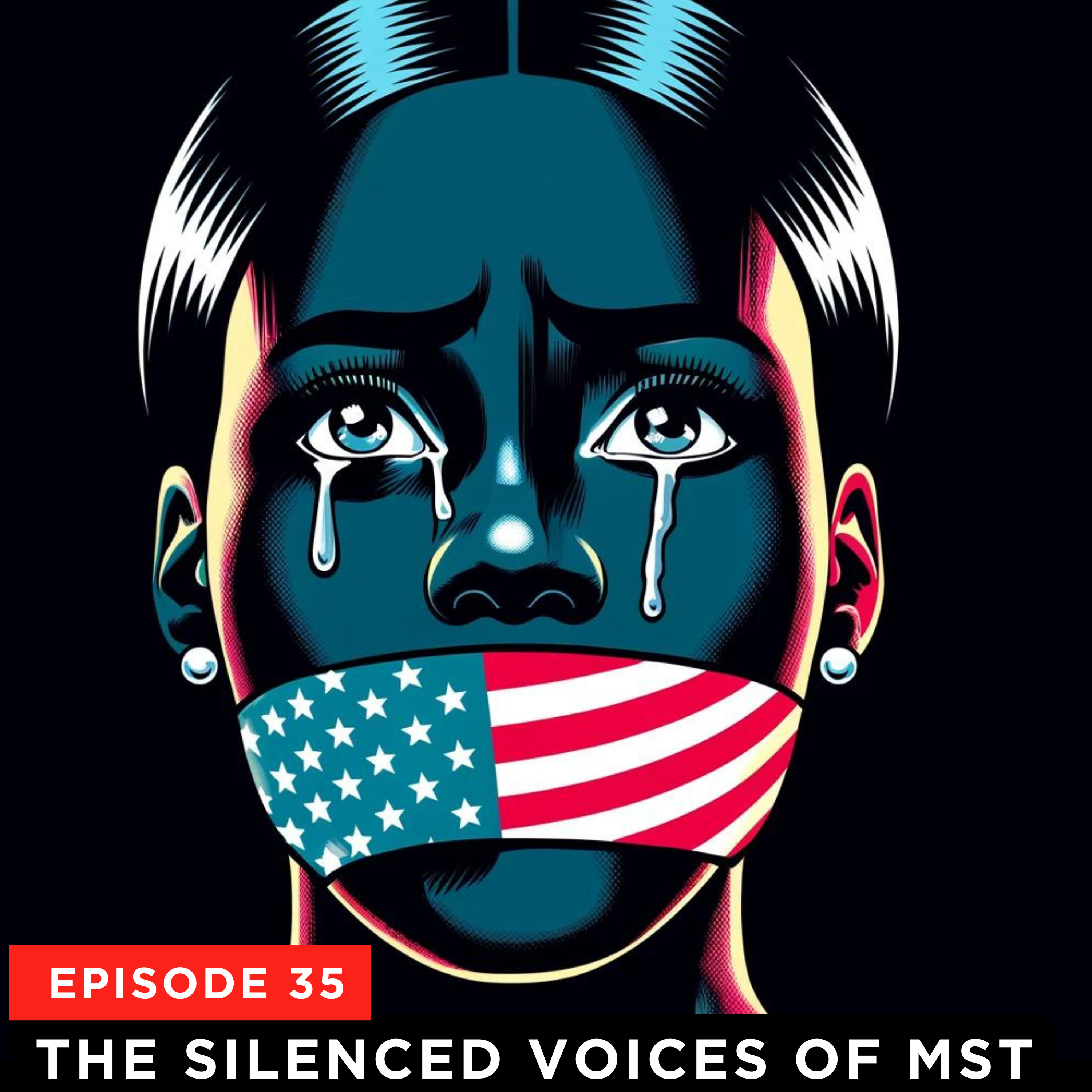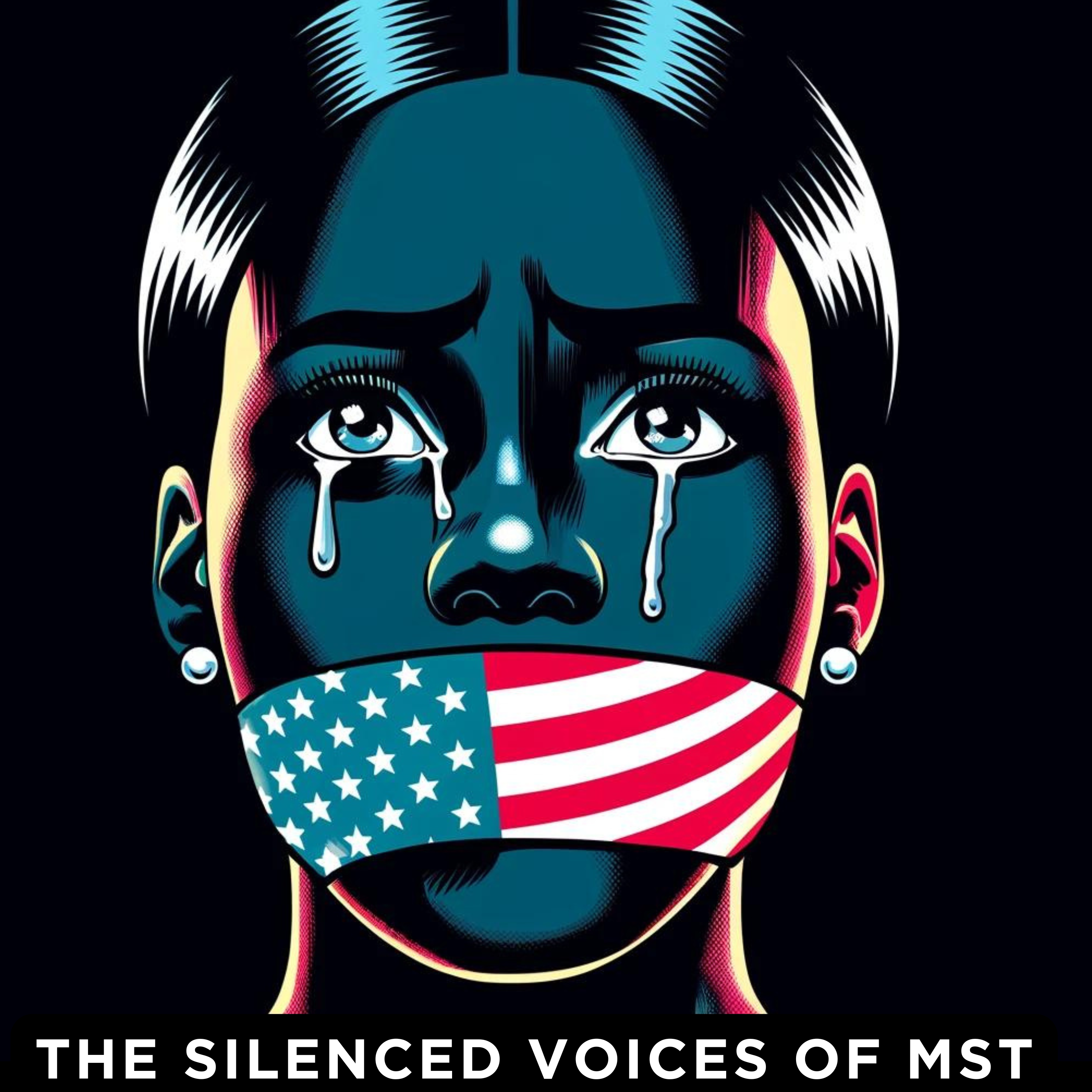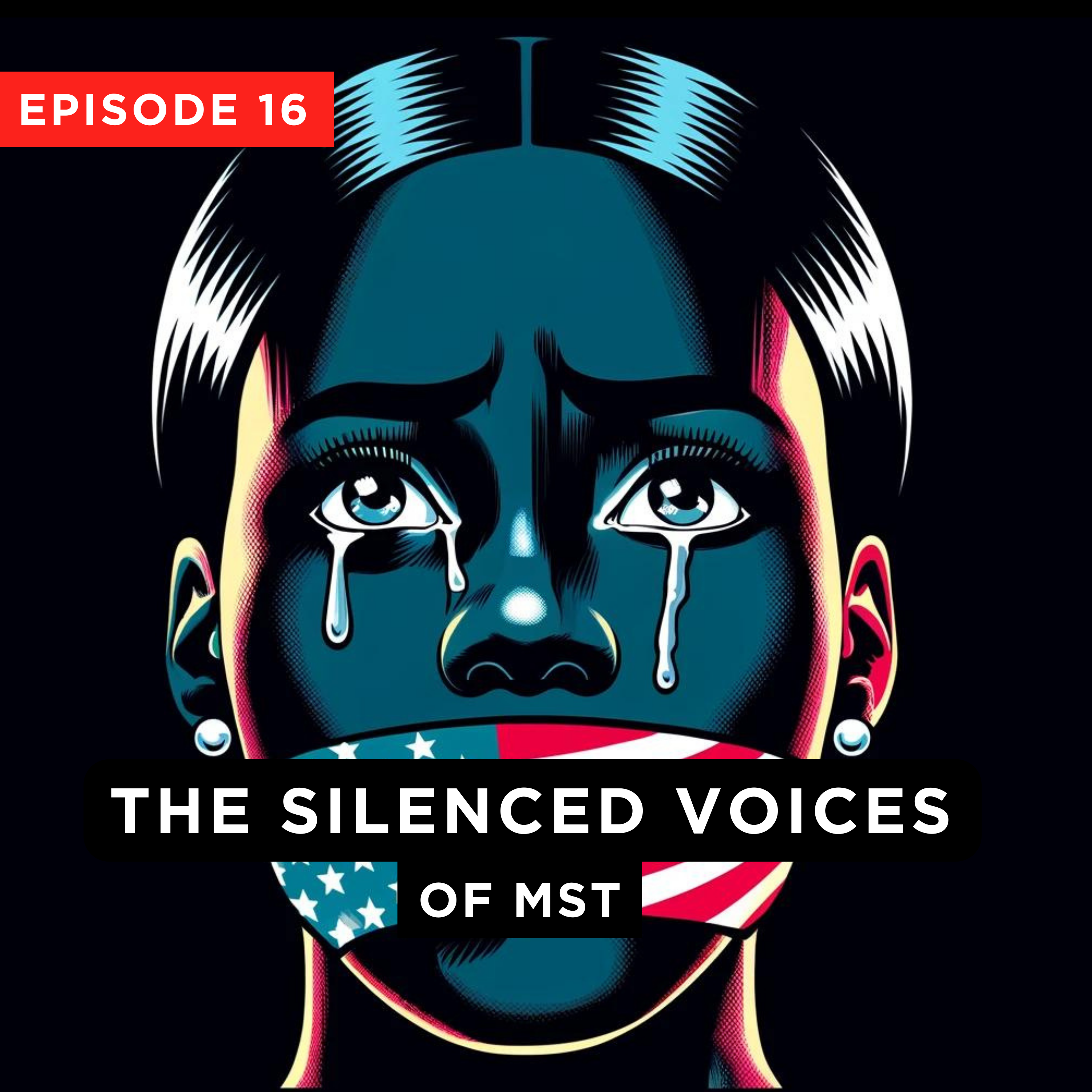Episode Transcript
[00:00:00] Speaker A: Hey, it's Rachelle, host of Silence Voices of mst. Sorry for the delay. We got called back into work, but not really trusting it. There's a lot going on. But this is the second part of Misty's story. She explains the map that she's created online. And I think you'll be really interested to see how she's found a way to represent MST in its entirety. And the more people that add their stories to that map, the more likely it is that we can isolate a particular perpetrator. And it's a really, really cool idea. And I'm so excited that she started this. So here's Misty.
[00:00:36] Speaker B: I remember after that I had a little diary, and I wrote in my diary, no more. And I've been mistreated too long, and I'm not. This is not going to happen. That's it. No more. And it's funny, after I wrote that, nothing really did happen after that, so I don't know how it made a difference, but I didn't really have any problems after that.
So thank goodness that was enough. Right.
[00:01:11] Speaker C: Right. If it was just like an internal. Like, this is never going to happen again. And maybe there was.
[00:01:19] Speaker B: Yeah, I was really.
Yeah. So I do think that's important because.
Yeah. What is it that predators or people who are trying to get away with things, what is it about me or any of us that they feel like they can get away with it?
[00:01:45] Speaker C: I think they definitely look through or naivety or trusting people or definitely. You had mentioned earlier having not so strict boundaries. I mean, myself included, there's plenty of us that we just never learned about that. To me, I thought, like, people are pretty much intrinsically good and on some level they're.
[00:02:14] Speaker B: Me, too.
I was. I really. And it's weird because I'm. I still find myself that way. I'm. Yeah, I did keep that, even though so much happened. But I. I think I told. I mentioned to you earlier that I do have a bit of dissociation. I think in some ways I feel blessed by that because I can still see people as good and I. I don't see everybody. You know, I'm not worried about everybody. Yeah.
[00:02:49] Speaker C: The way I've tried to look at it now is that when I meet someone initially, like, no, I'm not going to trust them right away, but I'm at least going to wait for them to do something for me to immediately think they're bad or need to be kept at a distance or something that might just be a part of healing and learning. About boundaries and learning what maybe unsavory people are looking for and knowing that you're not really displaying those things anymore. And you're also able to warn other people that you see displayed equations. So that takes away a lot of the power from predators because you have.
It's just lived experience, you know, where it's.
You're like, I. Like you said you wrote no. So it was like, I'm never falling for something like that again. And you made it happen, which is incredible.
The next section includes references to mental health struggles, an alcoholic parent, 9, 11, and the emotional aftermath of MST. If needed, skip ahead to 11 minutes and 49 seconds. But I did want to go back to. You said that you experience dissociation now, and that's a result of these events in your life.
[00:04:16] Speaker B: Yeah, because, you know, all this happened when I was 18, and then I got out.
And back then, there's no, you know, transitional services. You're just out. And so basically, I just.
Well, I was always pretending like nothing happened. And part of that is coming from, you know, my mom was an alcoholic, so there's always a secret in the house. You know, you're not supposed to tell anybody. You're not supposed to tell the bad things that happen. Or maybe it's just part of that childhood dynamic. Oh, I have secrets. You just keep secrets, and you're not thinking, I have secrets. It's just so integrated into you. That's just what you do.
So, yeah, I just went on as if nothing happened for 40 years.
[00:05:09] Speaker C: And that worked. Until it didn't.
[00:05:11] Speaker B: Yeah. So, you know, when I got out, well, I got married at 21, and I got married so young to another Marine. And part of it when I thought I would just get out of it, but then I actually went through with it. But one thing that made me happy about it was that he was at tech school, too. And I thought this person.
He saw what I went through. I wouldn't have to explain to anybody he saw it. But then I never really asked him.
It might have been oblivious. I just, you know, to me, everybody knew. I just had this. I thought that everybody knew, and every. Like, I just gave off this vibe, and everybody knew that bad things happened to me and that, you know, that maybe he didn't have any idea.
I don't know.
[00:06:16] Speaker C: That's how that particular trauma manifests in isolating you through shame.
[00:06:23] Speaker B: Right. Yeah. I had so much shame.
[00:06:26] Speaker C: Yeah.
[00:06:27] Speaker B: Yeah.
[00:06:27] Speaker C: And that's.
That's one of the hardest parts to work through is. Is not only not trusting other people, but, like, also not trusting and blaming yourself.
[00:06:42] Speaker B: Right.
[00:06:43] Speaker C: Yeah.
[00:06:45] Speaker B: After I got married, then shortly after that, I got pregnant, and then I got a federal job, which I was pretty happy with because I thought, this is going to take care of me. I was very happy to get a federal job. And so all that happened by the time I was 23.
And so I was just going on as if nothing happened. But I acted out. They. You know, I was a messy person.
It wasn't pretty.
[00:07:20] Speaker C: I can relate. I can relate. You probably trade some more stories and have gone through the same thing, because when you. When you push all that stuff down, like, no matter how well you think you're concealing it, it's. It's going to come out.
[00:07:36] Speaker B: Right. It doesn't. It doesn't work.
[00:07:39] Speaker C: No. And that sounds to me that was like the early 90s for you.
[00:07:44] Speaker B: Yeah, I got out in 1986 and got my federal job 1987. And my first son was born 1987. So everything went very quickly.
[00:07:58] Speaker C: Yeah.
[00:07:59] Speaker B: So then I was working there 16 years after I got out. Nine, 11 happened, and I went back in, but not the Marines, because I was, What, I was 38 years old. That's like great grandma for a Marine. So I went into the Air Force and the reserves, and it was really good for me to have another chance at joining the military. And I picked a better career, and I was around really good people, and it just went well for me. You know, I was a lot older. I actually ended up retiring from the reserves.
[00:08:42] Speaker C: Okay. Wow. What an incredible. Like, you had this redemption.
[00:08:47] Speaker B: It did feel that way, and it was very interesting to see the, you know, different eras and then also the different branches and.
Yeah, it was very, very different.
[00:08:59] Speaker A: Yeah.
[00:09:00] Speaker B: And it actually helped me with my behavior.
I mean, I had. I was getting older. You know, I was already behaving better because I was older, but it just. I felt so much more dignified once, you know, I was in and, you know, doing good things. It really felt good.
My kids, they were in middle school, and that was a bit. You know, my youngest son said, moms don't go in the Air Force.
I tell them, well, your mom is.
So that was an adjustment for them, but we made it.
[00:09:41] Speaker C: Yeah.
And after you got out, then what did you decide to do?
[00:09:47] Speaker B: Well, I was retirement age. It was. It was 2019, because if you think about it. Yeah. Because I was 38 when I went back in, and I did 15 more years. So it was just a few years ago. And so what happened Is my dad had Alzheimer's and I became his caregiver. And then there was Covid. And so I was staying there with my dad. My dad was kind of for Alzheimer's. He was pretty easy to be around.
So I was take. I started working on MST healing from mst. I got a trauma, a trauma counselor, and I put in an intent to file.
I. Right away I got an attorney, an accredited attorney, because I had filed one other time, and I did a very. I didn't. I didn't do a very good job. I just kind of wrote on paper what happened. And of course that's not going to do anything. And then because I was in the reserves, I would get letters from the VA after that, because the first time was 2006 or 7 when they started the whole MST thing came about in the military and there was training and stuff like that. So I filed a claim.
And then I just got all paranoid because I didn't want to give up my Air Force. I loved it, and so I just didn't want to pursue it. And I would get letters from the VA to try again. And I just know when I can't. You know, I don't have the time to go through the emotions because it really hurt to get the first rejection. That was painful. I was like. So I didn't want to go through that pain anymore and I wanted to stay in the reserves. So I just thought, well, maybe when I get out. So that's what I did. And my civilian job was very hectic, and the Reserves, you know, because I, you know, I was at the end of the career. There was a lot of things they wanted, even from the Reserve. So my professional life was kind of ridiculous. And then taking care of my dad. So it's. It's funny, but it's not funny. I kind of said some bad words to a young 21 year old at my civilian job. And so I really just had to go. Like the day I was eligible to retire for both the military and my civilian job, I was gone. Just first opportunity.
[00:12:44] Speaker A: This next section includes MST specific content, essay references, and predatory recruiter cases. If necessary, you can Skip ahead to 24 minutes, 48 seconds.
[00:12:56] Speaker B: But by the time that happened, I had 37 years of federal service and two tours in Iraq.
And so since I was 18 years old, I just go, go, go, go. It was weird to just stop everything.
So it was good to have, you know, something to work on the MST and to learn about it. And then the Vanessa Gann event happened, and there's so much going on, but I learned a lot. I was just really learning a lot. And there was so much I didn't know. I didn't. I don't even know if I'd ever heard of the word dissociation. And the trauma therapist that I had told me that. How do you use dissociation? So I'm Googling it. What is that?
And then when I had my CMP exam, my second one, because the first one didn't go very well, he mentioned that I had complex ptsd. And so I've never heard of that. What's that? You know, So I was really learning a lot in the past few years.
Oh, and I had the idea for MST Map.
[00:14:18] Speaker C: Yeah, I would definitely like to introduce the viewers and listeners to that.
What gave you the idea to. Well, actually, let's let you explain what it is first, and then.
[00:14:32] Speaker B: Okay, well, I will tell you really quick. In my civilian career, I work with data. So I like data. I started it out as Map mst, which I actually like that name better, but I use this really horrible design company.
And so Map MST is still up there, but they were always trying to charge, you know, for everything, so much money, and it just was terrible. So I took a couple of classes, and I made my own website. And it's amateurish, but, you know, I'm.
I'm just.
[00:15:09] Speaker C: I think it looks incredible.
[00:15:10] Speaker B: Okay, good. Thank you.
Because, you know, I only have me. I don't have a team, you know, I just have me. So.
So I'm like, well, I'll ask my husband. And he said, oh, it looks good. So I went with it. So what it is, is it is a map for mst. So the idea behind it is it's a collective story. And those that have been impacted by MST can place a marker where they were assaulted, and they can place more than one marker if they've had multiple events. Each marker is color coded by type of assault, and what's included is sexual harassment, cyber harm, sexual assault.
And there's a marker also for ROTC recruiters and MEPs. And one thing about that is, to me, there's not that very much attention on this. If we think about it, how many predators have been released into our local neighborhoods through ROTC and recruiters? And how many young people have been taken advantage of in their own hometowns? And then they never joined after being exploited?
So this map gives them a place to tell their story, too, because who knows what kind of numbers there are with that so can only imagine.
[00:16:45] Speaker C: Wasn't there this last year, Wasn't there? Like, I think he was a Marine Corps recruiter that had come out with a book, and it was. He explained, doing exactly that in it.
[00:17:00] Speaker B: Oh, yeah, yeah. I do remember reading about that. There was actually just, like, two weeks ago, this decorated veteran, you know, war veteran from Iraq or Afghanistan or both, and he was at a college, and he had been having inappropriate relationships, and he was fired. I think he was a lieutenant colonel. Yeah, yeah.
[00:17:26] Speaker C: So I want to say it was like Ohio.
[00:17:29] Speaker B: Yeah, yeah, yeah. So, yeah. So the thing is, you know, if you look at any kind of, you know, official MST data, there's always typically a note about the high percentage of unreported assaults. And that was part of what I would think about, well, who. I'm one of those unreported assaults. Who else is there? How, you know, how many countless people are there and what does that look like? And so that was part of the inspiration for the map, too. Just that little blurb about unreported assaults.
So hopefully it's a healing thing to put a marker on the map, and each marker, there are additional questions about your gender, the age that you were assaulted, and, you know, just demographics. And people can make a comment if they would like to, and that's it. So each marker. The idea is each marker tells the.
[00:18:41] Speaker A: Story of mst, and it's powerful to see.
[00:18:47] Speaker B: And I think we're on the same page with that. You know, just who are all these people that are out there, all genders? You know, there's so much that has happened, and, you know, I love what you're doing, and hopefully we'll make a difference. It just takes time.
[00:19:15] Speaker C: It definitely does. And since it's.
It's still very taboo, I would want to say, like, a lot of people are.
Not only are they not ready to speak about it, but people also aren't prepared to hear what we have to say.
Everybody holds the military in the highest regards, you know, for the most part. And they don't want to think like, there's predators or their children could potentially be in danger if they choose to serve their country.
[00:19:53] Speaker B: It's not a happy subject, and that is part of it.
Sometimes I create a Facebook ad so that my map gets out there. And it's kind of funny, actually. A lot more people visit and explore the. The website. Then I'm getting markers, which I was hoping to get more markers, but a lot of people are visiting and exploring the map, which is good.
But Sometimes just people make really crass comments or laugh emojis and it hurts. It's amazing how much it hurts to see a laugh emoji about, you know, this subject. And it's like, come on. Young people trying to serve their country are being harmed by their fellow service members and you just, you think that's something to put a laugh emoji about? I just, I don't know.
It hurts.
It's awful.
[00:21:01] Speaker C: People that do that stuff, A, they're either trolls and you know, they're looking for a reaction, or B, they feel so far removed from this issue where something like it can never happen to them until it does.
[00:21:16] Speaker B: Right. Then sometimes you'll look at their profile picture and they're standing there with their daughter and I'm. It blows me away. Oh my God.
[00:21:26] Speaker C: Yeah. And.
And it's not something that I would ever be like, oh, till it happens to you. I think more, I would like for someone to understand that there is a real human behind this little symbol.
[00:21:41] Speaker B: Right?
It's true.
[00:21:46] Speaker C: Yeah. Because I've seen some comments on, I think it was our YouTube and our tick Tock where.
But I put up a clip of, of the guests sharing their story and somebody wrote like, oh my God, who cares? With like a rolly eye emoji. And I'm just like, I'm not even going to respond to it.
[00:22:06] Speaker B: Yeah.
[00:22:07] Speaker C: You know, just delete it. Because I'm not going to sit here and argue with somebody who's trying to invalidate someone else's life.
[00:22:15] Speaker B: You can't change them.
They are. I mean, I do recognize they're trolls, but it's still, it just, it's weird. That's the one thing that just gets to me and it, I hate it.
[00:22:30] Speaker C: Yeah, well, that's understandable. But I think having your website out there and having this incredible way for people to see that they're not alone is huge. That is powerful in ways I can't explain because like we said before, you just feel so isolated by shame and oh, I don't want anyone to know. Although I also feel like everyone knows.
[00:22:59] Speaker B: And exactly that is so true.
[00:23:03] Speaker C: To give people a way to give it like a name and a shape and a way to express it very clearly and concisely. I love the color coding of it. It's incredibly smart and I'm trying to think of innovative. I think it is where it also goes around the whole planet. Right?
[00:23:28] Speaker B: Yeah, it is. And actually the way I set it up is because if you think about how many people have been assaulted on a ship and we've been people assaulted on an airplane or who knows? Yeah, because we're everywhere. Right. Because there's a loc surroundings at the time of the assault. And another one is combat zone. So there's. There has been one on a ship, a few in the combat zone and some that are in the, you know, recruiter MEPs areas. The more markers, the more impactful the whole thing will be. It's a crime map. And so it doesn't just tell the story of victims, it also tells a story about perpetrators.
And my vision, you know, my vision of this, the big picture is say, tons and tons of people put their markers and it may identify a recruiter in a small town with four or five markers around the same year. That possibly could happen. I'm not going to give up on it. It's going to stay there. I kind of imagine that with more and more markers where the most concentrated areas will be tech schools like Fort Jackson.
[00:25:06] Speaker C: That could possibly be an incredible way to finally hold people accountable for what they think they might have gotten away with 10, 20, 30 years ago.
[00:25:16] Speaker B: Yeah, it could. It's a possibility. It could happen.
[00:25:20] Speaker A: All right, that was misty. Isn't that incredible? What a cool idea. It's a perfect way to represent the magnitude of this issue, especially if you're not quite ready to talk about your story or put your face out there. So I think that this is an incredible option. I wish her all the best in maintaining this website and starting to hold these people accountable, because that's how we get changes, accountability. Also, we need to amplify the voices of these survivors that have come on the show and bared their souls. Leave us a five star rating and review on Apple Podcasts or wherever you get your podcast. We'll see you next week for the resolution of Misty's story. And remember, your voice is a weapon in the fight against mst.
[00:26:00] Speaker B: Thank you.




